
Remarkable Rwanda & Gorillas of Uganda Itinerary
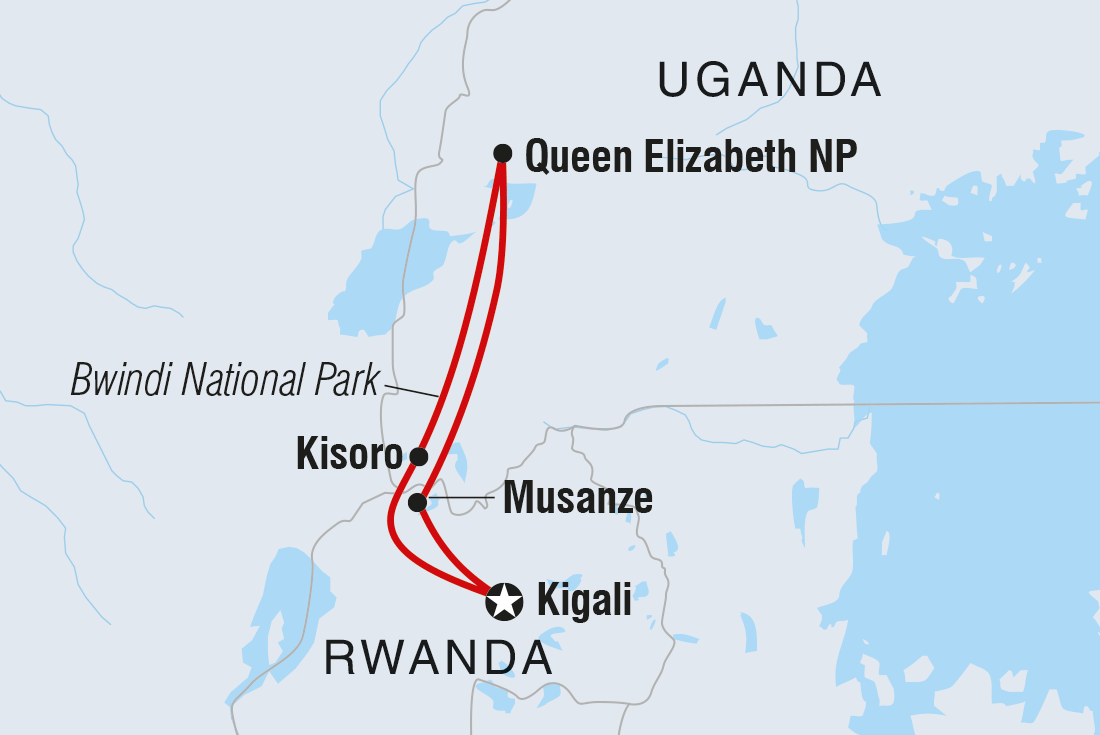


Welcome to Kigali, the capital of Rwanda since it gained independence in 1962. Most associate Rwanda with the horrific genocide that took place in 1994, but this is a country that has been striving to rebuild its economy for years and offers so much to the intrepid traveller. And though the past won't, and shouldn't, be forgotten, the future of Rwanda's tourism is looking bright thanks to its welcoming people, an abundance of lakes and the beautiful Virunga Mountains. Your adventure begins by meeting your fellow travellers and local leader at 6pm.
After breakfast this morning, your tour leader will take you to the Kigali Genocide Memorial Centre, which opened in 2004 to mark the 10th commemoration of the genocide against the Tutsi people. It serves as a museum detailing the history and consequences of Rwanda's genocide and a place for people to grieve for lost friends and family. This afternoon, you’ll drive to Musanze – the gateway to Volcanoes National Park, home to gorillas and golden monkeys.
This afternoon, you'll visit The Gorilla Doctors headquaters; the only organisation in the world dedicated to saving the mountain and eastern lowland (Grauer’s) gorilla species one gorilla patient at a time using veterinary medicine and science. They monitor the health of gorilla groups to ensure the early detection of disease and injury, and stage medical interventions when gorillas suffer from human-induced or life-threatening trauma or disease.
Today, you’ll visit the The Ellen DeGeneres Campus of the Dian Fossey Gorilla Fund. This research centre leads the world in protecting and studying gorillas while helping communities build their conservation capabilities. Learn about Dian Fossey’s life and the conservation of endangered mountain gorillas in Rwanda.
There are heaps of optional activities to do in Musanze, including Golden Monkey Trekking in the Virunga Mountains, the Mount Bisoke trek, or keep it chill with a canoe ride on the Mukungwa River. Maybe visit Redrocks Rwanda, where you’ll learn about the local banana beer production and be treated to some dancing, drumming and basket-weaving demonstrations.
Today, you’ll leave Rwanda as we cross the border into Uganda, making our way to Queen Elizabeth National Park. This park is home to 618 bird species, 10 species of primates - including chimpanzees, and 95 different types of mammals. The route to your accommodation may feel like an unofficial safari. Keep a look out for African elephants, buffalo, hippos, warthogs, Nile crocodiles, leopards, spotted hyenas, lions and chimpanzees. Tonight, stay in a simple safari lodge within the park overlooking the Kazinga Channel.
Wake up for another exciting day in Queen Elizabeth National Park with another 4x4 Game Drive. Be on the lookout for any sightings you may have missed yesterday, and if you’re really lucky, you might be able to spot leopards or lions.
This afternoon, you have the opportunity to see the park from a different perspective with an optional cruise down the Kazinga Channel, linking Lake Edward to Lake George. You’ll be joined by local guides who will fill you in on everything you could want to know about the landscape and the animals who live within it – be on the lookout for hippos basking on the shore, as well as crocodiles, herds of elephants and abundant birdlife.
This morning we make our way to Ishasha, the southern sector of Queen Elizabeth National Park. Here you meet some local residents to learn more about rural life in Uganda. Visit a local organic farm, medicine garden and homestead and learn how its owner is tackling human-wildlife conflict with his anti-crop raiding techniques. You’ll also meet a local Mukiga woman who will share her story while showing you how to sort, pound and grind millet to make porridge and other Bakiga meals.
This part of the park is famous for its tree climbing lions, so be on the look out as you make the game drive towards our ecolodge in the northern sector of the park frequented by herds of elephants, buffaloes and antelopes!
Today, drive out of the Queen Elizabeth National Park on your way to the southwest tip of Uganda (approximately 6 hours). The journey is like a game drive in itself, with the chance to spot zebras, antelopes, baboons and monkeys out the window. When you arrive at the corner of Uganda, where the border touches Rwanda and the Democratic Republic of Congo, you’ll be based in Kisoro, which provides access to seven different gorilla groups located in Mgahinga, Nkuringo, Rushaga and Nshongi.
Join a local guide and trackers as you climb through the rugged, mountainous terrain of Bwindi National Park in search of mountain gorillas. A quick lock of eyes with these creatures is a truly primal moment and visits are strictly controlled to minimise disturbance. Make no mistake, tracking gorillas is no walk in the park – it's called Bwinidi Impenetrable National Park for a reason. It can be wet, muddy, strenuous and uncomfortable, but the indescribable elation at coming across a group of gorillas is worth the effort. Spend a mesmerising hour with the gorillas as they eat, sleep, groom and play as the male silverback watches over them, then return to the lodge for dinner and to reflect on this incredible experience.
After breakfast this morning, it’s time to make the journey back to Kigali. When you arrive, there are no further activities planned and your adventure comes to an end. If you’d like to spend more time here, just speak to your booking agent.

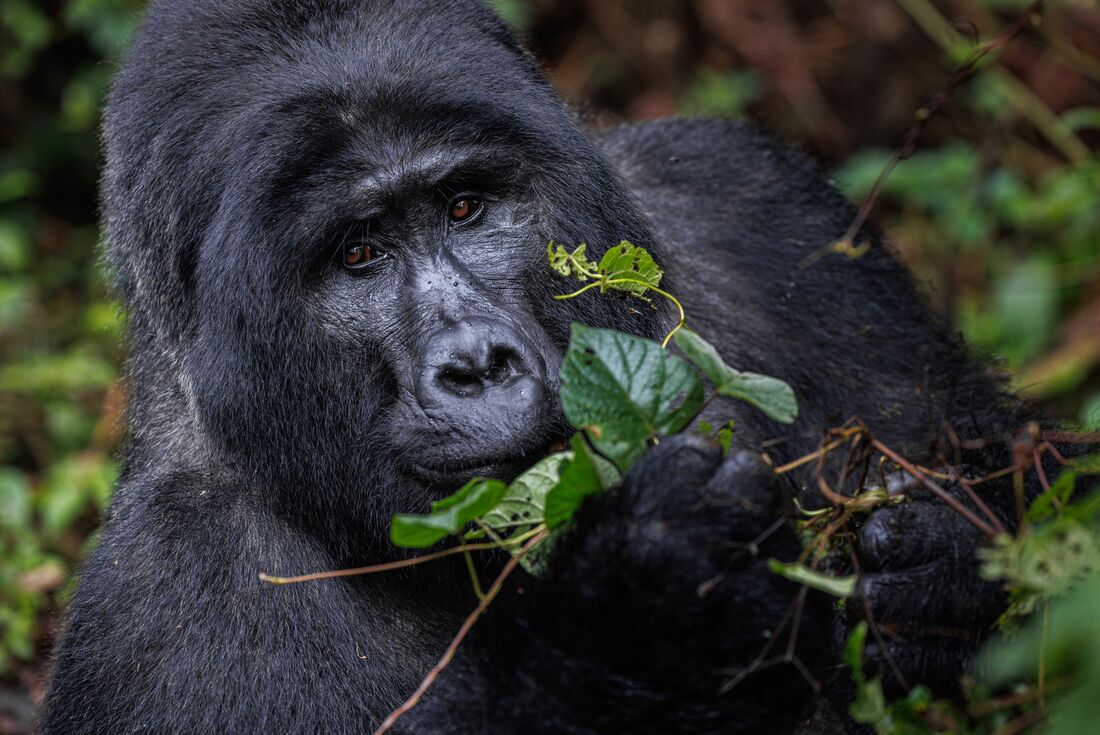
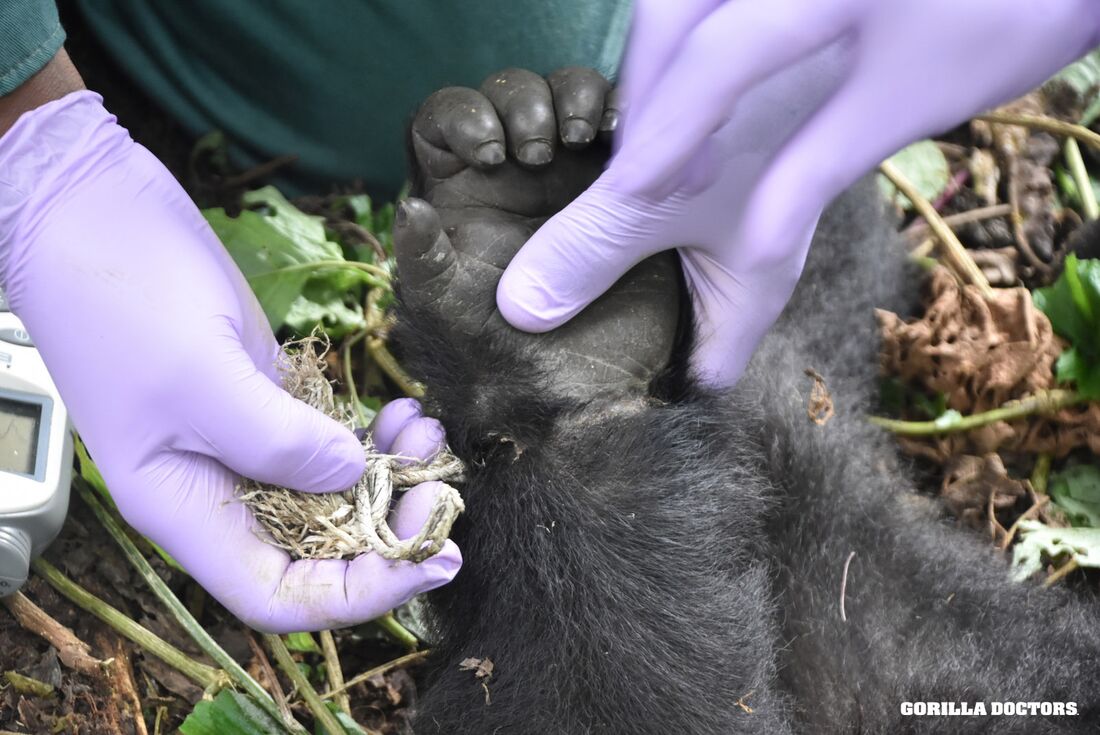
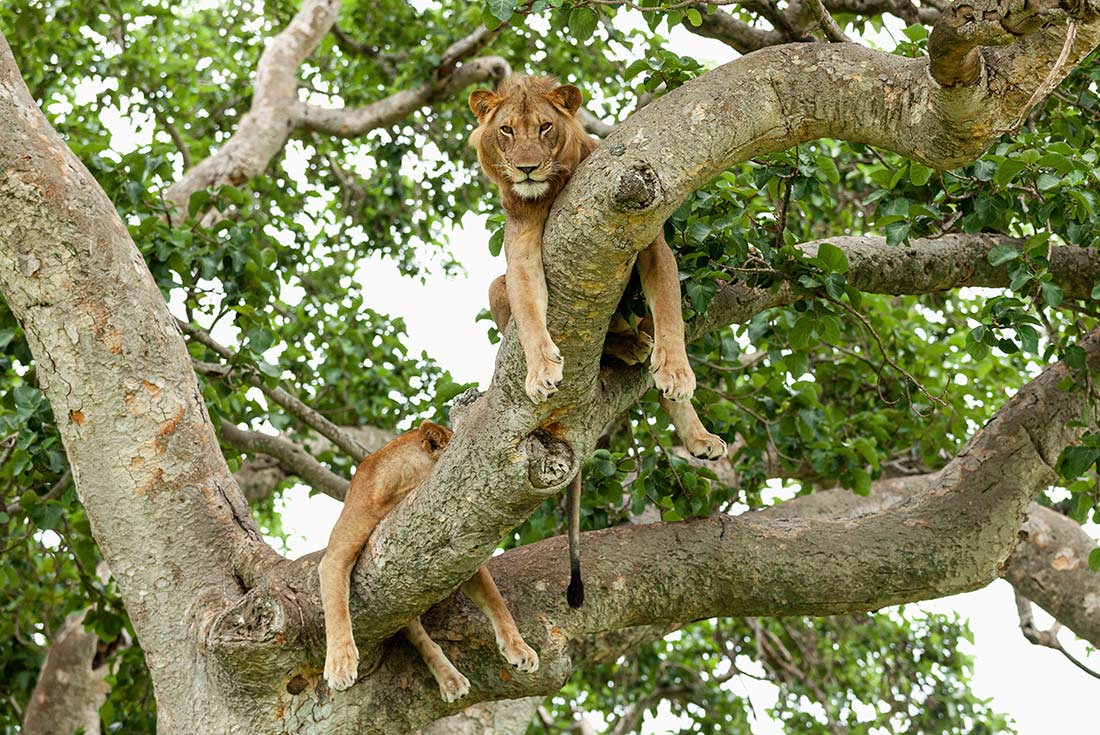
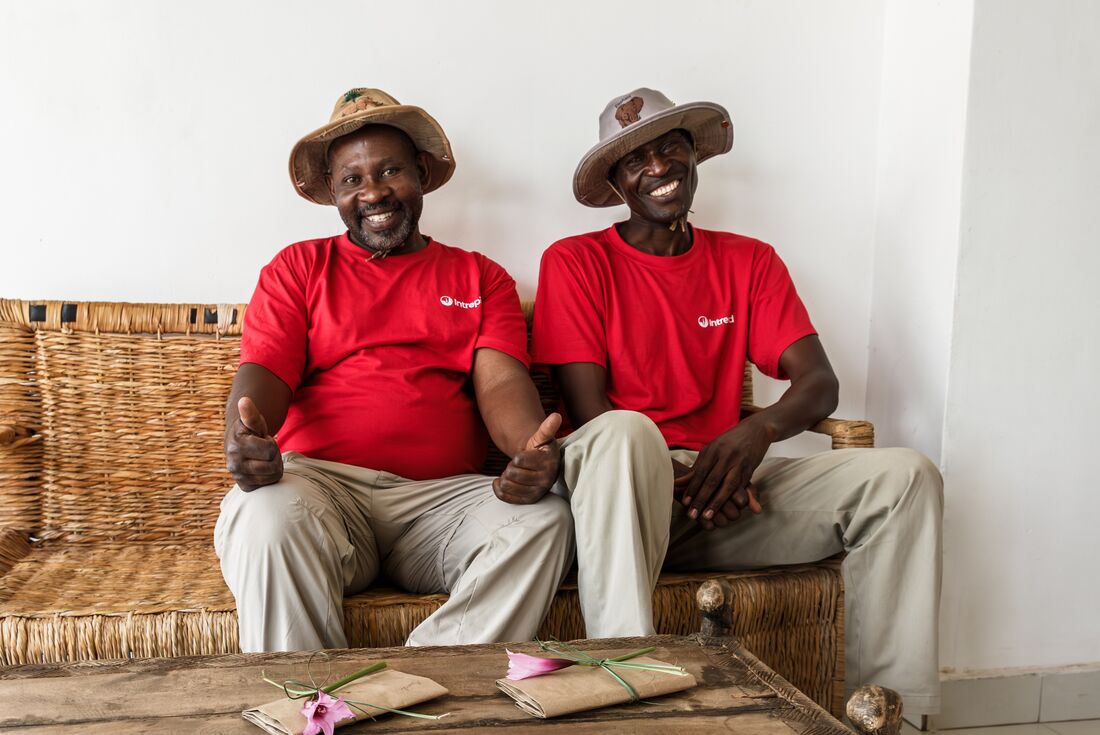
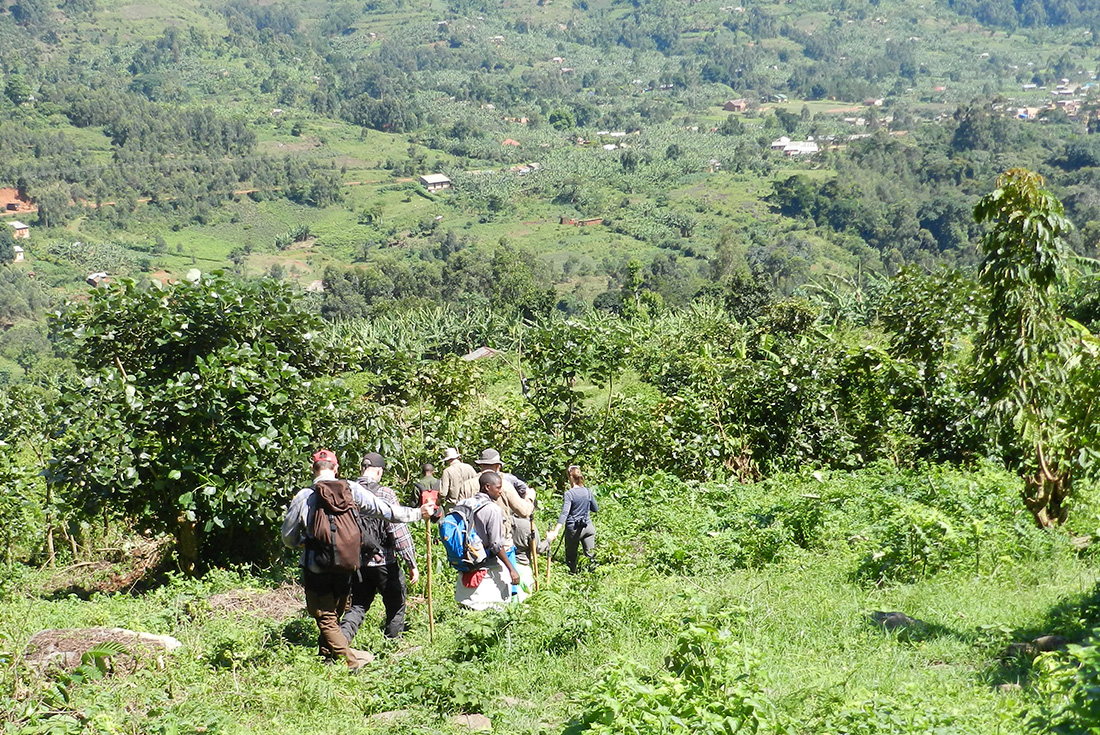
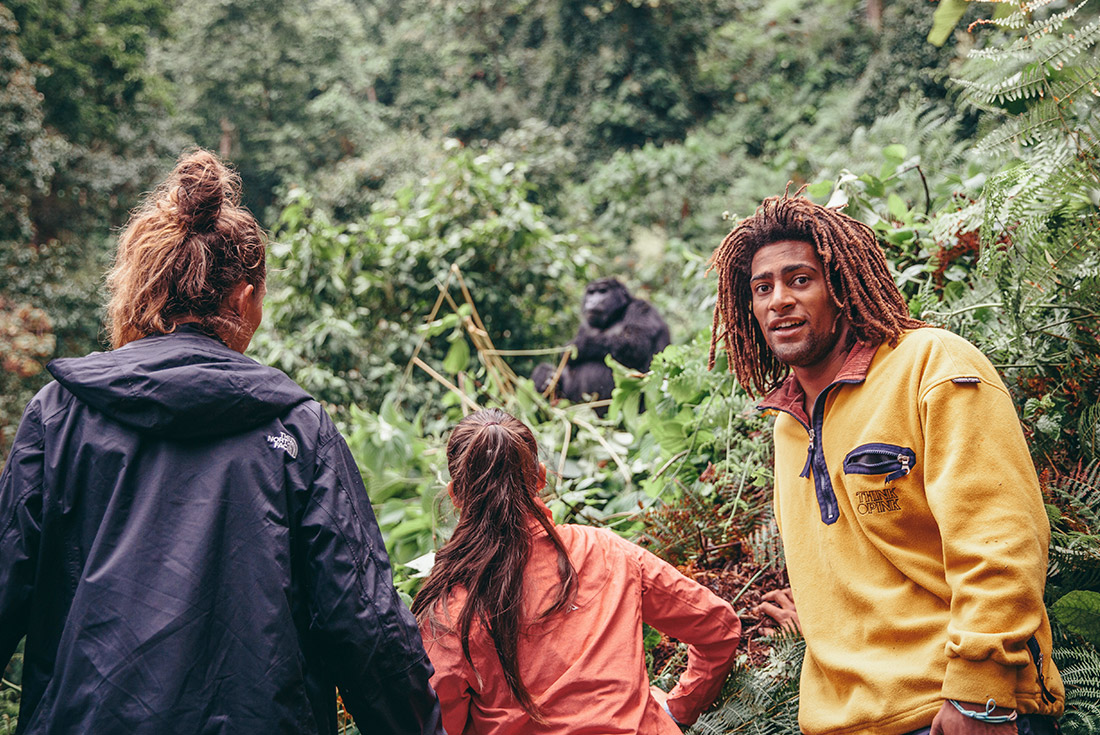
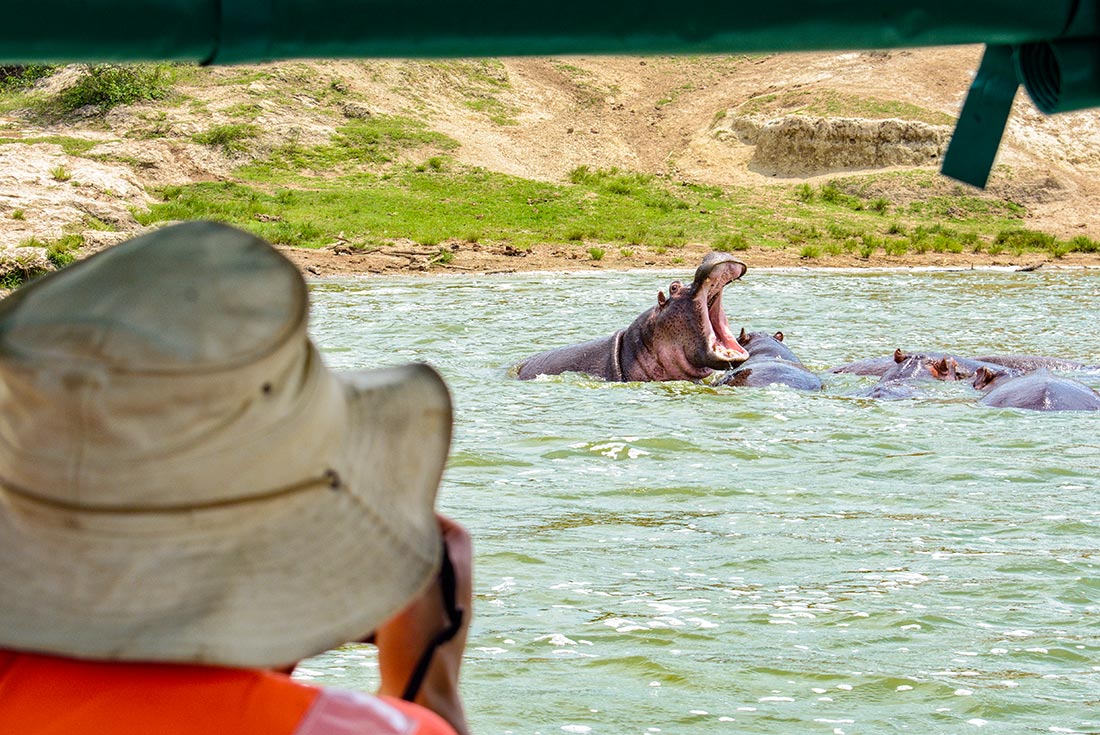
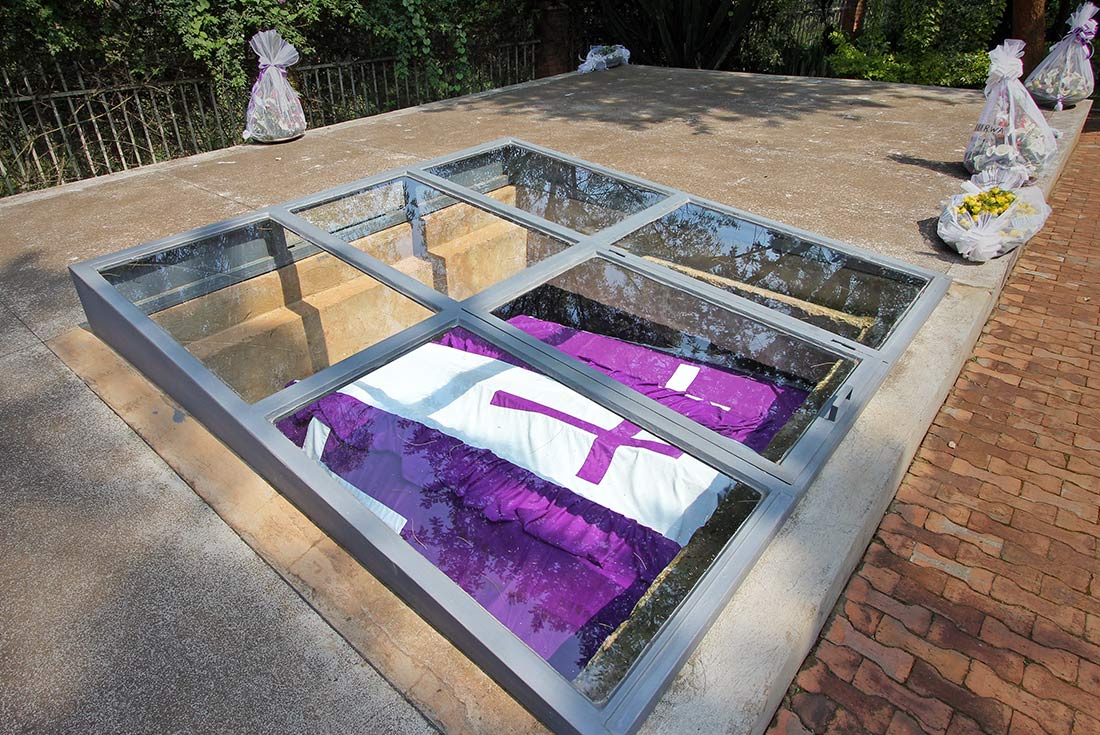
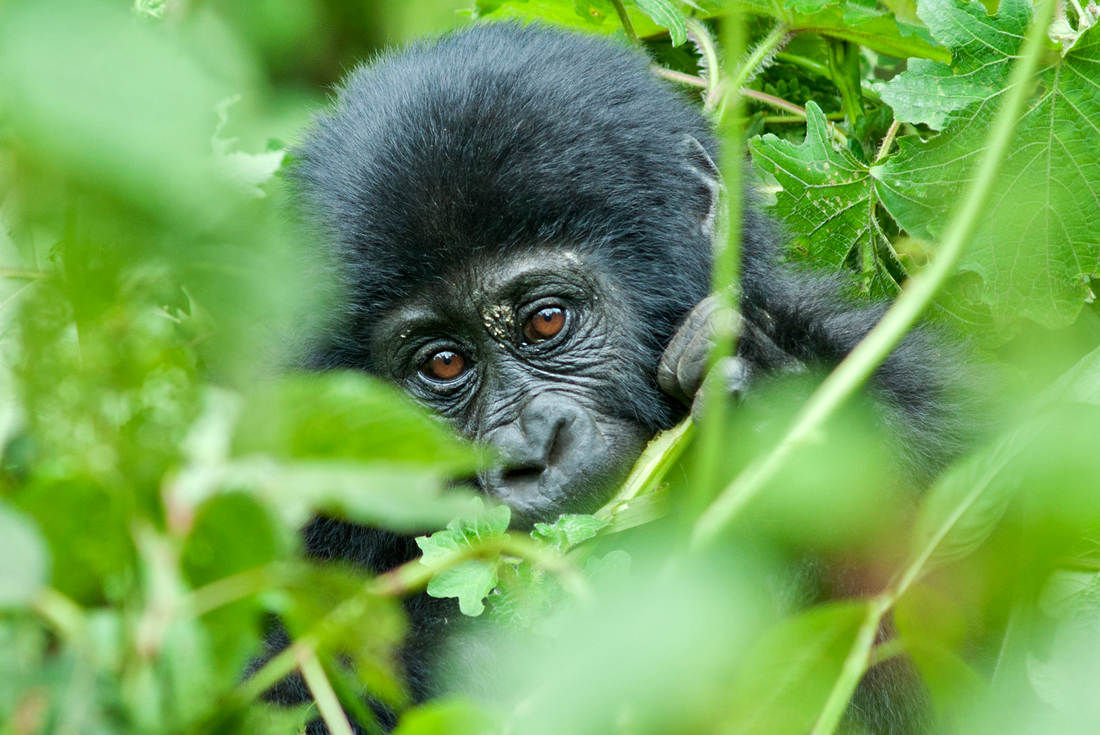
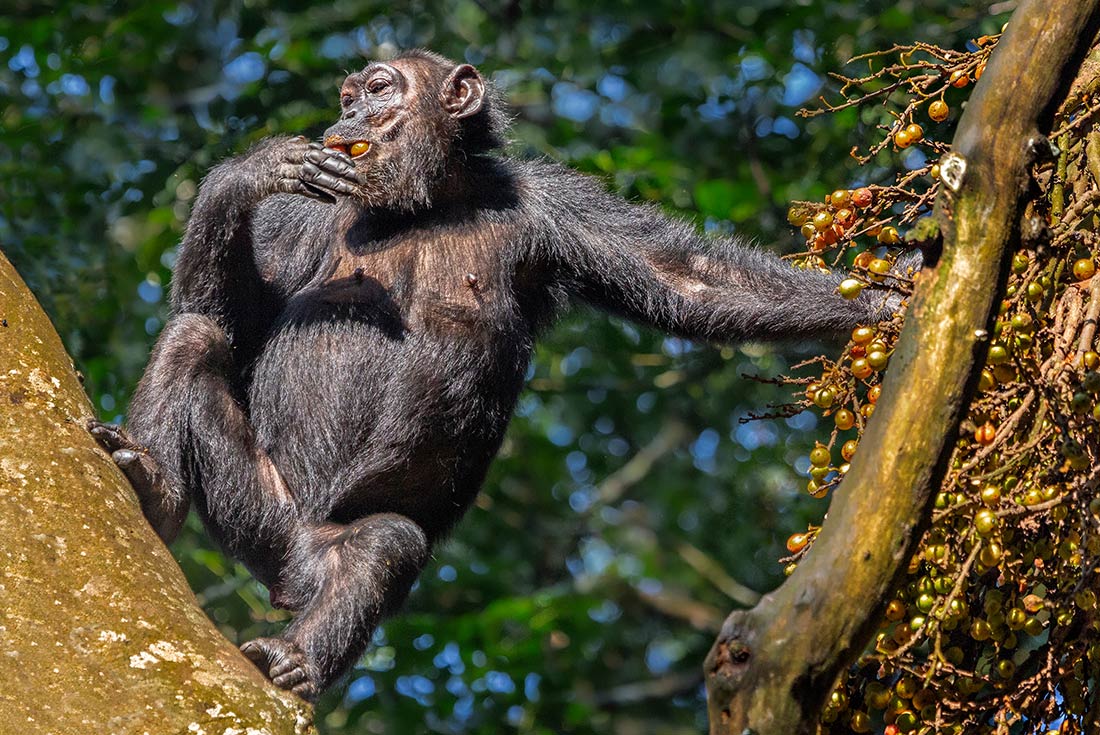
Kigali - Genocide Memorial Centre
Musanze - Visit to The Gorilla Doctors HQ
Queen Elizabeth National Park - 4x4 Game Drive
Ishasha - Community Tourism Project Visit
Queen Elizabeth National Park - 4x4 Game Drive
Bwindi National Park - Mountain Gorilla Permit & Trek
With gorilla permits included in the price of the trip, seek out the rare mountain gorilla on a trek through Uganda's steamy forests and spend an unforgettable hour in their presence.
Learn about Rwanda's devastating history with a visit to the Kigali Genocide Memorial Centre, and see what life looks like today with a tour of the city’s most vibrant neighbourhoods.
Get to know the diverse wildlife of Queen Elizabeth National Park on a series of 4WD safaris and an optional boat cruise around the lake.
You won’t even have to get out of bed to enjoy wildlife and wonderful views – Safari lodges and Eco Camps deliver epic scenery and wild visitors like elephants, buffalo, and hippos to your doorstep.
Visit The Gorilla Doctors HQ and learn about how they're saving the species one gorilla patient at a time, knowing that a proportion of your trip cost goes back to supporting the important work they do.
The Nest, 7 KG 6 Avenue, , Kigali, RWANDA, Phone: +250 790 008 935
The Nest, 7 KG 6 Avenue, , Kigali, RWANDA, Phone: +250 790 008 935
1. A single supplement is available if you’d prefer not to share a room on this trip. The single supplement applies to all nights of your trip and is subject to availability. Please speak to your booking agent for further information.
2. This trip starts in Kigali on Day 1 at 6pm. This allows time after the welcome meeting to explore Kigali.
This trip finishes upon arrival in Kigali on Day 9. Please do not book any flights until after 3pm in the afternoon.
3. This trip requires a higher non-refundable deposit (AUD1000, USD1000, EUR800, NZD1250, GBP650, CAD1000, ZAR8000, CHF900) in order to secure the included gorilla permit. Please note that we need to confirm availability of a gorilla permit if you are booking within 45 days of departure. The additional deposit paid at time of booking will be credited to the final balance of your booking.
4. Some governments currently have increased foreign travel advice around security in place for Queen Elizabeth National Park in Uganda. Please check your government’s foreign travel advice before departure and ensure your travel insurance covers all destinations and activities on your itinerary.
While we always endeavour to provide the best possible holiday experience, due to the nature of travel and the areas we visit sometimes things can and do go wrong. Should any issue occur while you are on your trip, it is imperative that you discuss this with your group leader or local representative straight away so that they can do their best to rectify the problem and save any potential negative impact on the rest of your trip.
We recognise that there may be times when your group leader or local representative may not be able to resolve a situation to your satisfaction - if this is the case, please ask the group leader or local representative to speak to their direct manager.
You may also choose to provide details in your online feedback, which we ask you to complete within 30 days of the end of your trip. Please do be aware that it is very difficult for us to provide any practical help after the trip is completed, so informing us while still travelling will give us the opportunity to resolve the issue in real-time., For transfers and accommodation issues, Intrepid's Kenya Office can be reached on their 24-hour number +254 758 555 556 or +254 758 555 557. , For any concerns regarding pre-booked transfers, you can reach out via WhatsApp at +250 787 665 114., For general contact details please use the following page: https://www.intrepidtravel.com/contact-us, In case of a genuine crisis or emergency, you can reach our local office on the numbers below:
, Intrepid's Local Operator: +254 758 555 550/1.
No two journeys in Africa are identical. Be prepared for travel times to be longer or shorter than advised. Weather and road conditions can change things significantly, so embrace the detours, shortcuts, and unforgettable moments along the way., This is a 4WD overland trip. That means you’ll be travelling with a group in 4WD vehicles, visiting remote communities and world-renowned wildlife parks. The drive days can be long, but it’s as much about the journey as the destination, and half the fun is the camaraderie., There will be many early starts either to make use of the better safari time or to beat the morning traffic on long travel days., The day-to-day itinerary features a selection of optional activities. Please note that this list is not exhaustive and is intended only as a guide. Prices are approximate and may change at the discretion of the local provider, and all activities are subject to availability., Tracking gorillas in the dense forest can sometimes be wet, muddy and uncomfortable. The terrain is by no means easy either, so it can be pretty strenuous and often humid. But the sheer thrill in coming across a habituated group of gorillas, dominated by a great male silverback, more than outweighs any difficulty. You need to be prepared and fit enough to walk up to 4 hours - up and down hill., You may also want to check out Gorillas & East Africa Safari if you have more time to explore in East Africa.
With gorilla permits included in the price of the trip, seek out the rare mountain gorilla on a trek through Uganda's steamy forests and spend an unforgettable hour in their presence., Learn about Rwanda's devastating history with a visit to the Kigali Genocide Memorial Centre, and see what life looks like today with a tour of the city’s most vibrant neighbourhoods., Get to know the diverse wildlife of Queen Elizabeth National Park on a series of 4WD safaris and an optional boat cruise around the lake., You won’t even have to get out of bed to enjoy wildlife and wonderful views – Safari lodges and Eco Camps deliver epic scenery and wild visitors like elephants, buffalo, and hippos to your doorstep., Visit The Gorilla Doctors HQ and learn about how they're saving the species one gorilla patient at a time, knowing that a proportion of your trip cost goes back to supporting the important work they do.
All group trips are accompanied by one of our group leader or local representative. The aim of the group leader or local representative is to take the hassle out of your travels and to help you have the best trip possible. Intrepid endeavours to provide the services of an experienced group leader or local representative however, due to the seasonality of travel, rare situations may arise where your group leader or local representative is new to a particular region or training other group leader or local representative.
Your group leader or local representative will provide information on the places you are travelling through, offer suggestions for things to do and see, recommend great local eating venues and introduce you to our local friends. While not being guides in the traditional sense, you can expect them to have a broad general knowledge of the places visited on the trip, including historical, cultural, religious, and social aspects. At Intrepid we aim to support local guides who have specialised knowledge of the regions we visit. If you are interested in delving deeper into the local culture at a specific site or location then your group leader or local representative can recommend a local guide service in most of the main destinations of your trip.
FREE TIME & OPTIONAL ACTIVITIES
Your group leader or local representative will accompany you on all included activities; however, during your trip, you'll have some free time to pursue your own interests, relax and take it easy or explore at your leisure. While your group leader or local representative will assist you with the available options in a given location, please note that any optional activities you undertake are not part of your Intrepid itinerary, and Intrepid makes no representations about the safety of the activity or the standard of the operators running them. Please use your own good judgment when selecting an activity in your free time. Please also note that your group leader or local representative has the authority to amend or cancel any part of the trip itinerary if it's deemed necessary due to safety concerns.
INTREPID SAFETY STANDARDS
For more details on the type of conditions and safety standards you can expect on your trip, please refer to Intrepid's operational safety policy on our website. We recommend that you take a moment to read through this information before travelling, and would appreciate any feedback on how well it's being implemented in the field:
www.intrepidtravel.com/safety-guidelines
, BILHARZIA
Bilharzia is a parasitical disease which is usually spread by swimming in contaminated water. It can be assumed that the infection is present, to a greater or lesser extent, in almost all water sources, but most especially in shallow reedy waters in the vicinity of villages.
Although the adult parasites do not themselves cause a great deal of harm, after about 4-6 weeks they start to lay eggs, which triggers an intense but usually ineffective immune response, the symptoms of which can include fever, cough, abdominal pain, and an itchy skin complaint known as safari itch. After a while the symptoms settle down and the patient is left with a sense of feeling tired all the time., LGBTQIA+ TRAVELLERS IN UGANDA
Uganda's law prohibits same-sex relationships and convictions under these laws may result in severe sentences. Same-sex public displays of affection, like kissing in public places, could lead to arrest and imprisonment. LGBTQIA+ travellers should carefully consider the risks of travelling to Uganda. , FOREIGN TRAVEL ADVICE FOR QUEEN ELIZABETH NATIONAL PARK
Some governments have increased foreign travel advice around security in place for Queen Elizabeth National Park in Uganda. In particular, the UK government has heightened travel advice in response to a recent targeted attack on UK travellers in Queen Elizabeth National Park. Insurance coverage (particularly for UK travellers) may be affected by this level of advice. Travel insurance that covers all destinations and activities within your itinerary is compulsory to join this trip. Please check your government’s foreign travel advice before departure and contact your insurance provider to ensure you have the appropriate level of coverage for travel to Queen Elizabeth National Park.
PASSPORT
You’ll need a valid passport to travel internationally and most countries require your passport to have a minimum of 6 months validity, so remember to check the expiry date.
We need your passport information to get everything ready for your trip so it’s important that the information on your booking matches your passport exactly. Please take care to provide the correct details. We recommend carrying a copy of the photo page of your passport while travelling and leaving a copy at home with family or friends.
VISAS & ENTRY REQUIREMENTS
Many countries require a visa and obtaining the correct visa for your trip and any countries you may transit through is your responsibility. We recommend you check your visa requirements as soon as you have booked your trip. This will ensure you have time to prepare your documents and for your visa application to be processed. You can check the entry requirements for your nationality on your government's foreign travel advisories, consular websites or on our page here: www.intrepidtravel.com/visa-entry-requirements, ADDRESS FOR VISA APPLICATIONS:
If you require an address for Visa Applications in Rwanda, please use:
Five Volcanoes Boutique Hotel
Ruhengeri, Rwanda
+250 739 373 971
LETTER OF INVITATION
KENYA / RWANDA:
If you require a letter of invitation or a list of hotel confirmations, please contact your booking agent, and we will issue one tailored to your specific tour and departure.
UGANDA:
If you require a letter of invitation or a list of hotel confirmations, please contact your booking agent, and we will issue one tailored to your specific tour and departure.
For more information, please visit - https://visas.immigration.go.ug/#/help/visa
BORDER CROSSINGS ON THIS TRIP:
Exit Rwanda - Cyanika (Day 4)
Enter Uganda - Kyanika
Exit Uganda - Kyanika (Day 9)
Enter Rwanda - Cyanika
Information not available.
Validity: 01 Jan 2026 to 31 Dec 2026
GENERAL HEALTH
All travellers need to be in good physical health in order to participate fully on this trip. For the safety and wellbeing of yourself and others, if you are unwell prior to travelling, please stay at home and contact us to make alternative arrangements.
When selecting your trip please make sure you have read through the itinerary carefully and assess your ability to manage and enjoy our style of travel. Please note that if in the assessment of our group leader or local representative a traveller is unable to complete the itinerary without undue risk to themselves and/or the rest of the group, we reserve the right to exclude them from all or part of a trip without refund.
You should consult your doctor for up-to-date medical travel information or for any necessary vaccinations before departure. We recommend that you carry a first aid kit as well as any personal medical requirements in their original packaging as they may not easily be obtained while travelling. If you are carrying medication, ensure you check your government's foreign travel advice for any local restrictions or requirements.
, YELLOW FEVER:
A valid international certificate of vaccination against Yellow Fever is required in many countries if you are arriving from a country with risk of yellow fever (eg. Kenya). You may need to present this on arrival at the airport or border crossing. Some countries will refuse entry if you are unable to present your certificate. It's also quite common for your home country to request a Yellow Fever certificate on your arrival back home.
It is your responsibility to check with your doctor well in advance of leaving home about the Yellow Fever requirements for the countries you'll be visiting.
, MALARIA & DENGUE
Malaria and Dengue are mosquito-borne diseases commonly found in many parts of Africa. Before you travel, discuss your itinerary with a doctor and monitor your government foreign travel advice for up-to-date information on risk levels in particular areas. To reduce your risk of mosquito bites, protect yourself by using insect repellent and wearing long, loose, light-coloured clothing.
Malaria symptoms typically appear 7–30 days after infection and may include fever, chills, headache, and fatigue. Doctors can prescribe medication to help prevent Malaria, so it’s important to consult your healthcare provider before travelling.
Dengue symptoms generally emerge 4–10 days after being bitten. These may include high fever, severe headache, joint and muscle pain, nausea, and rash. As there is no specific medication for Dengue prevention, avoiding mosquito bites is key.
If you develop symptoms of Malaria or Dengue while travelling or after returning home, seek medical attention straight away.
, DRINKING WATER
As a rule, we recommend you don't drink tap water, even in hotels, as it may contain much higher levels of different minerals than the water you are used to at home. For local people, this is not a problem as their bodies are used to this and can cope, but for visitors drinking the tap water can result in illness. Generally, this isn't serious, an upset stomach being the only symptom, but it's enough to spoil a day or two of your holiday. Many hotels and lodges provide safe drinking water, while bottled water is another alternative. Water consumption should be about two litres a day. Rehydration salts, motion sickness tablets, and diarrhea blockers are available from many pharmacies - please source from home and bring them with you on your travels.
Hotels and your group leader will endeavour to cater for specific dietary requirements where possible, and vegetarianism and gluten intolerance will be catered for in most instances, however your diet may be limited more than you are used to. Please notify your sales consultant at the time of booking of any dietary requirements plus your group leader in your group meeting at the start of the trip.
SPENDING MONEY
When it comes to spending money on the trip, every traveller is a little different. You know your spending habits better than we do, so please budget an appropriate amount for things like optional meals, drinks, shopping, optional activities, and laundry. Make sure you have read the itinerary and inclusions thoroughly so you know what is included in the trip price and what you may need to pay for while travelling. , CREDIT CARDS, ATMS AND EXCHANGING MONEY
ATMs are available in most major towns and cities and even some campsites. Withdrawal limits vary between countries, sometimes as low as USD 100 per day, and will differ from your withdrawal limit at home. Smaller shops and restaurants only accept cash. Foreign currency is easily changed at exchange bureaus, who generally offer the best rates. If you are bringing USD cash we strongly recommend large bills in good condition, 2013 series onwards only. Any old or damaged notes may not be accepted.
Credit cards are generally accepted in tourist shops and some restaurants across Africa. Visa and Mastercard are preferred.
If you're on a multi-country trip, your leader will be able to give you an approximate idea of how much money you may need in each country.
, MEALS NOT INCLUDED
Please review your Itinerary for which meals are included. For meals that aren’t included, we recommend budgeting USD 15 – 35 per lunch and USD 20 – 50 per dinner., TIPPING
Tipping can be an appropriate way to recognise great service when travelling. While it may not be customary in your home country, it is an entrenched feature of the tourism industry across many of our destinations and is greatly appreciated by the people who take care of you during your travels. It is always best to avoid tipping with coins, very small denomination notes, or dirty and ripped notes, as this can be regarded as an insult rather than the goodwill gesture it is intended to be., We recommend budgeting approximately USD 10 per traveller per week to tip local service providers for activities included in this trip. This doesn’t include a tip for your leader or crew., YOUR GROUP LEADER OR LOCAL REPRESENTATIVE
Tipping your group leader or local representative is highly appreciated if you feel they’ve provided outstanding services throughout your trip. The amount is entirely a personal preference; however, as a guideline, the recommended amount is 4-7 USD or EUR per traveller per day (in a currency relevant to your destination). Of course, you are free to tip more or less as you see fit, depending on your perception of service quality and the length and involvement of your group leader or local representative on your trip., ADDITIONAL CREW
You may have additional crew on your trip, such as a local guide, driver or cook. We recommend tipping each person USD 2 – 4 per person per day (in a currency relevant to your destination)., CONTINGENCY FUNDS
We try to plan for every eventuality, but there are still some things beyond our control. We reserve the right to change an itinerary after departure due to local circumstances or a Force Majeure Event. In such emergency circumstances, the additional cost of any necessary itinerary alterations will be covered by you. Please note we are not responsible for any incidental expenses that may be incurred as a result of the change of itineraries including but not limited to visas, vaccinations or non-refundable flights. Make sure you have access to an extra US$500 for emergencies (e.g. severe weather, natural disasters, civil unrest) or other events that result in unavoidable changes to the itinerary (e.g. transport strikes or cancellations, airport closures). Sometimes these things necessitate last-minute changes to enable our trips to continue to run, and as a result, there may be some extra costs involved. The recommended amount is listed in USD for the relatability of universal travellers, however, local currency may be needed once in the country to cover these costs., COMMISSIONS
Intrepid understands that the receipt of commissions in exchange for recommending particular shops or services is ingrained in the culture of the tourism industry. For this reason, we have established a centralised fund for contributions from recommended suppliers so these can be collected and distributed back into the business. Actively managing the receipt of commissions helps us maintain the level of quality you expect on one of our trips. Travel is always an adventure so Intrepid cannot explicitly guarantee the quality of a product but we aim to provide the best value trips in the market. Please let us know via the feedback form completed after your trip if we are successfully meeting - or exceeding - this objective.
LUGGAGE LIMIT
The luggage weight limit is maximum 20kg per person, but we recommend packing as lightly as possible. We recommend backpacks or duffel bags, as large framed suitcases can be difficult to fit, especially when the vehicle is at full capacity. Please contact your booking consultant if you think you will have issues with this luggage limitation.
GORILLA TREKKING SPECIFICS
- Tracking gorillas can be wet, muddy, and physically challenging with sharp, prickly foliage and steep hillsides.
- You must wear a surgical mask within 10 metres of the gorillas. For more info on how masks help protect gorillas, see our Responsible Travel section.
- A walking stick will be provided, and you can hire a porter for 20 USD (plus tip) to carry your day pack and assist with the trek. Hiring a porter supports local communities and encourages gorilla conservation.
CLOTHING & FOOTWEAR
- Waterproof hiking boots for navigating wet, muddy, and uneven terrain on gorilla trek
- Gardening gloves for easier grip on trees and bushes while trekking
- Long Socks to tuck pants/trousers into and protect against ants or insects
- Neutral or dark-coloured rain jacket (bright colours are not permitted in the park
- Surgical face mask (provided on-site or bring your own)
- Lightweight, long shirts and pants for protection against the sun and insects
- Comfortable clothing for hot weather; shorts, t-shirts, activewear
- Closed-toed comfortable walking shoes to protect your feet in wilderness areas
- Sandals suitable for wearing during water based activities
- Fleece or jumper/sweater for cooler mornings/evenings
- Sun protection – sunglasses and securable sunhat
- Swimming costume
- Sarong, scarf, or buff for dusty roads and cooler temps
- Nightwear, especially if travelling on twin-share
- Beanie
TOILETRIES & PERSONAL CARE
- Sunscreen - biodegradable, reef-safe, and waterproof if available
- Biodegradable shampoo, conditioner, soap, detergent, etc.
- Toiletries - toothbrush, toothpaste, razor, nail clippers, etc.
- Tropical strength insect repellent
- Antiseptic hand sanitizer
- Personal medical kit. Your guide will carry a large kit, but we recommend you carry items such as mild painkillers, electrolytes, anti-diarrhea, antibacterial gel, wet wipes, after-sun, band aids/plasters, etc.
ELECTRONICS
- Power bank or spare batteries
- Charging cords and necessary adapters for the countries you're visiting
- Head torch (recommended) or flashlight
LUGGAGE & SLEEPING GEAR
- A smaller backpack to take with you on day excursions and gorilla trekking
- Travel pillow
- Earplugs
OTHER ITEMS
- Reusable water bottle (min 1 litre) preferably with a filter
- Camera
OPTIONAL EXTRAS
- Reusable dry bags to keep your belongings and clothes dry
- Water purification tablets
- Binoculars
TOP TIPS
- Ex-military or military style clothing and equipment is NOT recommended.
- Pack layers to add or remove as the temperatures fluctuate throughout the day.
- Wear neutral-colored clothing while on safari to blend in with the environment and avoid disturbing wildlife.
- Account for your personal temperature preferences—if you tend to run hot or cold, pack accordingly to stay comfortable.
LAUNDRY
Most hotels and lodges offer laundry services for a fee.
POWER
Our vehicles are equipped with multiple power boards, which may be used at the crew’s discretion; however, do bear in mind that only a minimal number of items can be charged at a time and will not be allowed if there is a risk of running the vehicle’s batteries low. We recommend power banks and multi-country power converters.
DRESS CONSIDERATIONS FOR WOMEN AND GENDER-DIVERSE TRAVELLERS
In certain parts of Africa, we recommend women and gender-diverse travellers dress in a way that respects local customs and traditions. While there’s a wide range of cultural practices, we recommend packing a few items like skirts or shorts that reach just above the knee, tops that cover the shoulders, or cover-ups when stepping off the beach in coastal areas. Your leader will be able to advise you on when it is appropriate to dress more conservatively.
, PLASTIC BAG BANS
To reduce single use plastic, many countries in Africa have banned the import and use of plastic bags. Your luggage may be searched upon entry. Exceptions will be made for plastics that are essential for health and hygiene. We recommend obtaining reusable waterproof bags prior to entry for things like dirty laundry.
Information not available.
Intrepid won't tolerate any kind of violence, harassment (whether physical, verbal or sexual), or disrespect toward fellow travellers, our teams or local communities.
To ensure the wellbeing of everyone on the trip, decisions made by your group leader are final.
Romantic relationships between travellers and group leader or local representative are not permitted while on trip.
Any behaviour that prevents your leader from continuing the itinerary as planned, breaks local laws or opposes any of these guidelines may result in Intrepid denying your booking or removing you from the trip.
If something concerns you during your travels, please speak to your group leader immediately. Alternatively, you can contact us on the emergency contact number detailed in the Problems and Emergency Contact Information section of this Essential Trip Information.
Information not available.
The group will be split into 2 six seater 4WD vehicles. While the drivers are qualified guides and will have expert local knowledge, your Intrepid leader will swap between the vehicles to ensure their knowledge is also shared.
Travel insurance is compulsory on all our trips for those travelling internationally. We require that, at a minimum, you are covered for medical expenses, including emergency repatriation. If you are travelling within your home country or region, please confirm before travel that you are entitled to access the public medical system easily should an accident occur. We strongly recommend all travellers have a policy that also covers personal liability, cancellation, curtailment and loss of luggage or personal effects. For international trips, you will not be permitted to join the group until evidence of travel insurance and the insurance company's 24-hour emergency contact number has been sighted by your group leader or local representative.
If you have credit card insurance, your group leader or local representative will require details of the participating insurer/underwriter, the level of coverage, policy number, and emergency contact number, rather than the bank's name and your credit card details. Please contact your bank for these details prior to arriving in-country.
For travellers who reside within the European Union, Switzerland or the USA, the requirement to purchase travel insurance cannot be compulsory. However, the purchase of travel insurance is still highly recommended, and each country you visit may have its own specific entry requirements. For example, some mandate travel health insurance for all foreign travellers, regardless of their nationality. Travellers from the European Union, Switzerland or the USA who decline travel insurance when travelling outside their home region must sign a Travel Insurance Waiver Form at the Group Meeting, recognizing personal responsibility for emergency medical and repatriation costs should they arise.
For assistance with travel insurance or other services, please visit the link below:
, https://www.intrepidtravel.com/booking-resources/our-services
As you travel on a group trip you will be exposed to all the pleasures and maybe some of the frustrations of travelling in a group. Your fellow travellers will probably come from all corners of the world and likely a range of age groups too. We ask you to be understanding of the various needs and preferences of your group - patience with your fellow travellers is sometimes required for the benefit of everyone's travel experience. Remember too that you have responsibilities to the group. If you are requested to be at a place at a certain time, ensure that you don't keep the rest of the group waiting. We have found time and time again that the very best trips we operate are those where the dynamics within the group work well - this takes just a little effort on your part. Due to privacy reasons, we are unable to provide you with contact details and any personal information about your fellow travellers booked on your trip prior to departure., SOLO TRAVELLERS
On our trips, rooming is organised on a twin-share basis. We pair up solo travellers with another traveller of the same gender, as per the gender marker on each of their passports.
We also offer an optional single supplement on most trips for travellers who prefer to have their own room. This only applies to accommodation during the tour. Pre-trip and post-trip accommodation booked through us will always be on a single-room basis.
On a small selection of trips some accommodation will be open-gender and multishare, such as a felucca in Egypt or an overnight train in Vietnam. Please review the Accommodation section of the Essential Trip Information for details about your trip.
LGBTQIA+ TRAVELLERS
We strive to create a safe and inclusive environment for everyone. If your gender identity differs from what is indicated on your passport, please contact us so that we can discuss rooming options with you.
OPTIONAL ACTIVITIES
A selection of optional activities that have been popular with past travellers are listed in the day-to-day itinerary. This isn't an exhaustive list and should be used as a guide only for some of what might be available. Prices are approximate, are for entrance fees only, and don’t include transport to and from the sites or local guides unless indicated. All activities are subject to availability, and maybe on a join-in basis. It may not be possible to do all the activities listed in the time available at each destination, so some pre-planning for what you are most interested in is advised. When it's recommended that travellers pre-book these activities, look for a note in the Special Information section of the day-to-day itinerary. For most, they can either be organised independently on the day, or let your group leader or local representative know you are interested at the Welcome Meeting and they can assist.
Where activities are considered medium or high risk, we work with operators whose safety and credentials we have sighted and assessed. Although it is possible that you may find the same activity cheaper with another operator on the ground, we cannot vouch for the safety or quality of that operator. Medium and high-risk activities not listed above have not been assessed by us and as such our staff and group leader or local representative are unable to assist you with organising these activities. Activities that contravene our Responsible Travel policies are also not listed. Please remember that the decision to partake in any activity not listed is at your own discretion and risk., ROAD CONDITIONS AND INFRASTRUCTURE IN AFRICA:
Roads in Africa are often in very poor condition, which makes it hard on our vehicles. Our vehicles are serviced regularly and are generally in good condition, but breakdowns can and do happen. Sometimes the going on this trip is quite tough, the distances covered fairly large and some of the roads and tracks are not exactly smooth or free from dust, but the rewards are exceptional. The travelling times indicated in our Essential Trip Information is just a rough guide and is dependent on various factors that may be outside our control, such as road conditions, weather and time spent at borders.
DRIVE TIMES:
The travel times listed in the day to day itinerary are a guide only. Please be aware that delays may occur and please be patient - it's all part of the experience afterall! Additionally, the travel times do not include time spent on game drives as these can vary with each departure., ITINERARY CHANGES
Our itineraries are updated regularly throughout the year based on customer feedback and to reflect the current situation in each destination. The information included in this Essential Trip Information may therefore differ from when you first booked your trip. It's important that you review this information prior to travel so that you have the latest updates. Due to weather, local conditions, transport schedules, public holidays, political unrest or other factors, further changes may be necessary to your itinerary once in-country. Your group leader or local representative will keep you up to date with any such changes once your trip is underway and has the authority to amend or cancel any part of the trip itinerary if deemed necessary due to safety concerns.